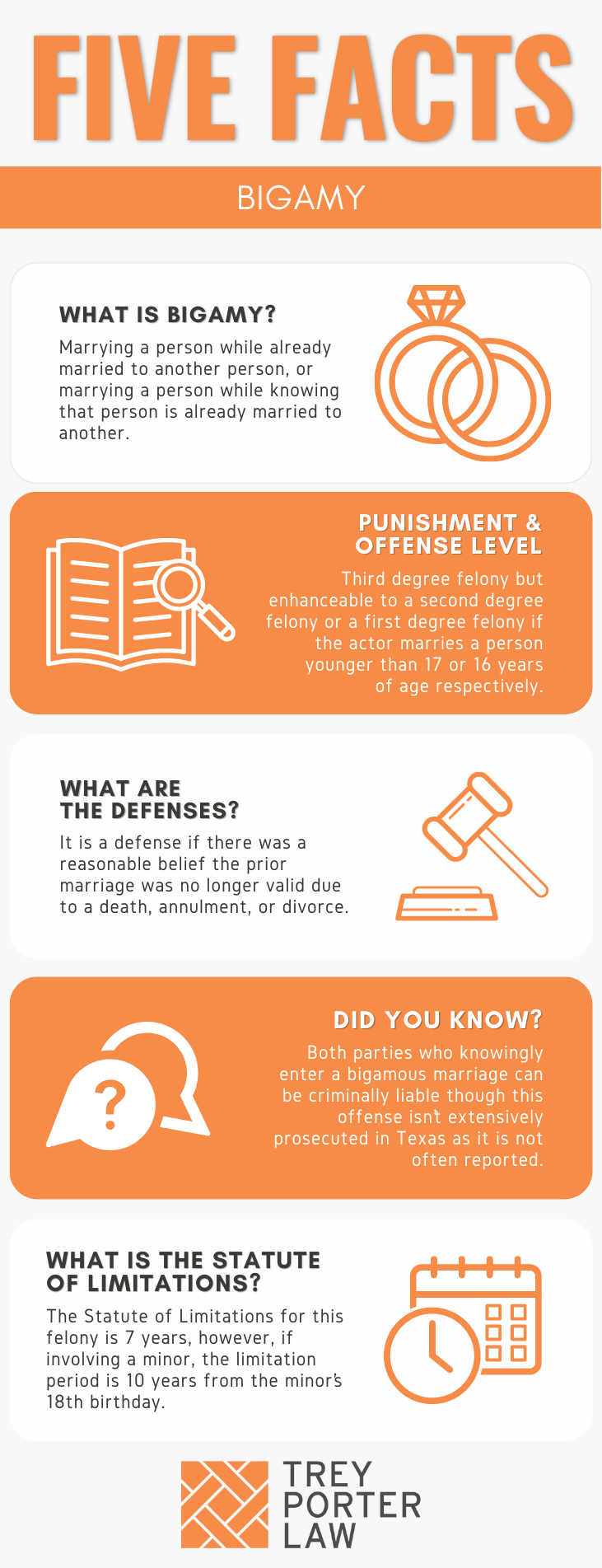WHAT IS BIGAMY IN TEXAS?
Texas law prohibits bigamy, or marrying someone while legally married to someone else. The person who marries the already-married individual may also be prosecuted for bigamy, if the person knows the other is married.

WHAT IS THE BIGAMY LAW IN TEXAS?
Tex. Penal Code § 25.01. BIGAMY.
(a) An individual commits an offense if:
(1) he is legally married and he:
(A) purports to marry or does marry a person other than his spouse in this state, or any other state or foreign country, under circumstances that would, but for the actor’s prior marriage, constitute a marriage; or
(B) lives with a person other than his spouse in this state under the appearance of being married; or
(2) he knows that a married person other than his spouse is married and he:
(A) purports to marry or does marry that person in this state, or any other state or foreign country, under circumstances that would, but for the person’s prior marriage, constitute a marriage; or
(B) lives with that person in this state under the appearance of being married.
. . .
(c) It is a defense to prosecution under Subsection (a)(1) that the actor reasonably believed at the time of the commission of the offense that the actor and the person whom the actor married or purported to marry or with whom the actor lived under the appearance of being married were legally eligible to be married because the actor’s prior marriage was void or had been dissolved by death, divorce, or annulment. For purposes of this subsection, an actor’s belief is reasonable if the belief is substantiated by a certified copy of a death certificate or other signed document issued by a court.
(d) For the purposes of this section, the lawful wife or husband of the actor may testify both for or against the actor concerning proof of the original marriage.
(e) An offense under this section is a felony of the third degree, except that if at the time of the commission of the offense, the person whom the actor marries or purports to marry or with whom the actor lives under the appearance of being married is:
(1) 17 years of age, the offense is a felony of the second degree; or
(2) 16 years of age or younger, the offense is a felony of the first degree.
WHAT IS THE PENALTY CLASS FOR BIGAMY IN TEXAS?
The penalty classification for bigamy depends on the other person’s age. Bigamy may be charged as a:
- Third degree felony by default, punishable by two to ten years in prison;
- Second degree felony, punishable by two to 20 years in prison, if:
- the individual the person marries is 17 years of age;
- First degree felony, punishable by five to 99 years or life in prison, if:
- the individual the person marries is 16 years of age.
WHAT IS THE PUNISHMENT RANGE FOR BIGAMY IN TEXAS?
The punishment range for bigamy charged as a third degree felony is between two and ten years in prison, and a maximum fine of $10,000. Bigamy charged as a second degree felony carries a possible two to 20 years in prison, and up to a $10,000 fine.
First degree felony bigamy, which is committed by marrying a 16-year-old while married to someone else, is punishable by five to 99 years or life in prison, and up to a $10,000 fine.
WHAT ARE THE PENALTIES FOR BIGAMY IN TEXAS?
A person charged with bigamy may be eligible for probation after a conviction, or deferred adjudication without a conviction, for a period of up to ten years.
WHAT ARE THE DEFENSES TO BIGAMY IN TEXAS?
The bigamy statute provides a reasonable-belief defense. One’s reasonable belief that he was free to get married negates the culpable mental state required to commit bigamy. This is because the bigamy statute requires the accused to know he was still legally married, or the person whom he married was already married to someone else.
- What if the person thought he or she was legally divorced? Texas Penal Code Section 8.02 provides a mistake of fact defense for a person who, “through mistake, formed a reasonable belief about a matter of fact if his mistaken belief negated the kind of culpability required for the commission of the offense.”A reasonable belief one is divorced negates the culpable mental state required to prove bigamy—i.e., that the person knowingly enters into a marriage while legally married to another.
WHAT IS THE STATUTE OF LIMITATIONS FOR BIGAMY IN TEXAS?
The limitation period for bigamy is seven years. However, if the person illegally marries a minor, the limitation period is ten years from the 18th birthday of the minor.
BIGAMY IN TEXAS
Bigamy is not commonly prosecuted in Texas, because it is not often reported. Punishment for either party involved in a bigamous relationship discourages reporting one’s purported spouse, because the reporting party would risk prosecution as well.
The “bigamy enhancement” may be used in sexual assault prosecutions if either the victim or defendant was married to someone else at the time of the sexual assault.
















